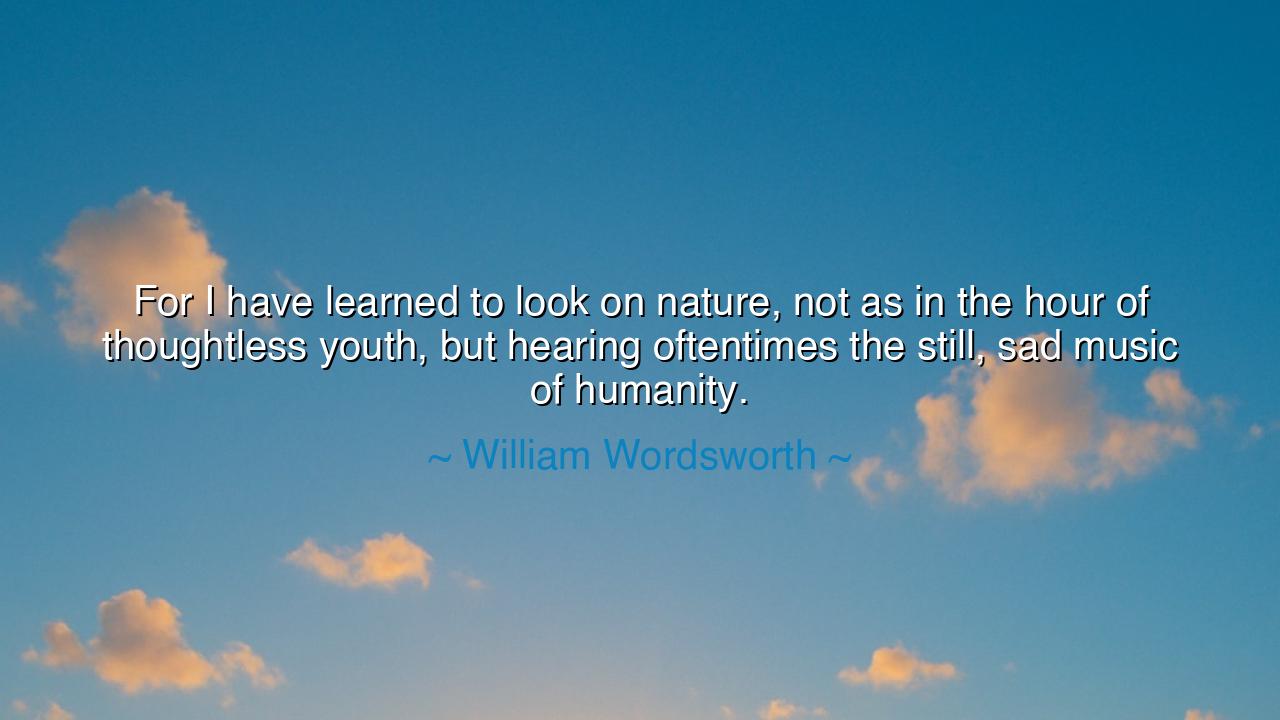
For I have learned to look on nature, not as in the hour of
For I have learned to look on nature, not as in the hour of thoughtless youth, but hearing oftentimes the still, sad music of humanity.






The poet-philosopher William Wordsworth, whose soul was attuned to the whispers of creation, once wrote: “For I have learned to look on nature, not as in the hour of thoughtless youth, but hearing oftentimes the still, sad music of humanity.” These words, born from his immortal poem “Tintern Abbey,” speak of the transformation that time and sorrow bring to the human heart. Where once he saw nature with the bright eyes of youthful delight, he now perceives in it a deeper harmony—a melody mingled with sadness, beauty, and wisdom. In this reflection, Wordsworth captures the eternal truth that maturity is not the loss of joy, but the deepening of it.
The origin of this quote lies in Wordsworth’s pilgrimage back to the Wye Valley, where he had first visited five years earlier as a young man. In his earlier days, nature was to him a spectacle—vivid, wild, and thrilling. But upon returning, older and tempered by the trials of life, he found that the forests, rivers, and mountains spoke differently. They were no longer merely pleasing to the senses; they stirred the depths of his soul. Through them, he began to hear what he called the “still, sad music of humanity”—the quiet, universal song of existence, where joy and sorrow flow together like twin rivers. This was not despair, but awakening: an understanding that the beauty of the world is inseparable from its impermanence, and that all things—man, nature, and time—are bound by the same fragile harmony.
In his youth, Wordsworth saw nature as an escape from human toil—a radiant world untouched by pain. But as he grew, he learned that even in the most serene valley, the shadow of mortality lingers. The wind in the trees, the ripple of the river, the flight of birds—all echo the transient nature of life. Yet this realization did not sadden him; it ennobled him. To hear the “sad music” of life is to perceive its true rhythm—to understand that sorrow and beauty coexist, and that one deepens the other. The music of humanity, he calls it—sad, yes, but still. For it speaks not of chaos, but of order, of acceptance, of the divine melancholy that accompanies wisdom.
History abounds with souls who, like Wordsworth, have learned this sacred lesson. Consider Marcus Aurelius, emperor and philosopher of Rome, who ruled not from joy but from burden. Amid war, death, and duty, he found solace in reflection. “All is fleeting,” he wrote, “but in the passing, all is precious.” His insight mirrors Wordsworth’s: that the mature heart sees in every sorrow the proof of life’s worth. The laughter of childhood, the tears of age, the song of nature—all are verses in the same eternal hymn. The wise do not flee from sorrow; they listen to it, and in its cadence, they find meaning.
This understanding marks the difference between innocence and enlightenment. The child delights in beauty because it pleases; the sage delights because he knows it will fade. To appreciate a sunset fully, one must know that night is coming. Wordsworth teaches us that the world’s melancholy beauty is not to be feared, but embraced. It is through awareness of mortality that our compassion for life grows. When we see a leaf fall or a loved one age, we are reminded that every moment is sacred, and every joy is the shadow of something greater—a reflection of eternity itself.
The lesson, then, is not to mourn the passing of youth’s thoughtless joy, but to welcome the wisdom that replaces it. Look upon nature—and life—not merely as a spectacle for pleasure, but as a teacher. Hear in its silence the voice of all humankind, whispering lessons of humility, resilience, and love. When you feel sorrow, listen closely; beneath it hums the same music that moves the stars and stirs the heart.
So, my child, when you stand before the mountains, the ocean, or the quiet of your own heart, remember the words of William Wordsworth: “Not as in the hour of thoughtless youth, but hearing oftentimes the still, sad music of humanity.” Let your heart be open to both joy and sorrow, for in their union lies wisdom. The laughter of the young is bright, but the song of the wise is deep—and in its stillness, you will hear the echo of all who have lived, loved, and learned to find peace within the world’s eternal rhythm.






AAdministratorAdministrator
Welcome, honored guests. Please leave a comment, we will respond soon